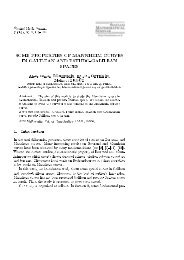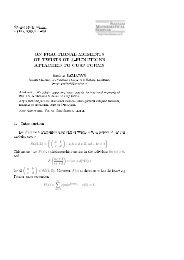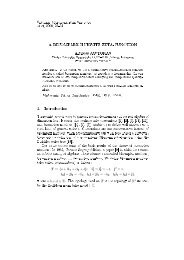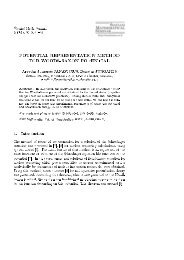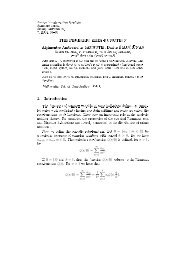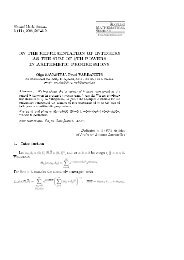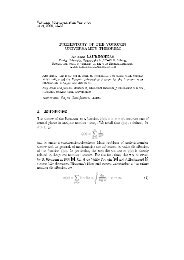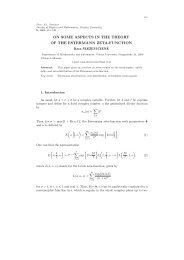a limit theorem for the hurwitz zeta-function in the space of analytic ...
a limit theorem for the hurwitz zeta-function in the space of analytic ...
a limit theorem for the hurwitz zeta-function in the space of analytic ...
You also want an ePaper? Increase the reach of your titles
YUMPU automatically turns print PDFs into web optimized ePapers that Google loves.
80 A <strong>limit</strong> <strong><strong>the</strong>orem</strong> <strong>for</strong> <strong>the</strong> Hurwitz <strong>zeta</strong>-<strong>function</strong>...<br />
Lemma 5. Let T → ∞ and 1 2<br />
< σ < 1. Then<br />
∫ T<br />
0<br />
|ζ(σ + it, ω, α)| 2 dt = BT<br />
<strong>for</strong> almost all ω ∈ Ω.<br />
Pro<strong>of</strong>. Let<br />
Then<br />
Denote<br />
ζ m (σ, ω, α) =<br />
ζ(σ, ω, α) =<br />
ω(m)<br />
(m + α) σ , m ∈ N 0.<br />
∞∑<br />
ζ m (σ, ω, α).<br />
m=0<br />
ˆζ(σ, ω, α) = |ζ(σ, ω, α)| 2 .<br />
S<strong>in</strong>ce<br />
E|ζ m (σ, ω, α)| 2 =<br />
1<br />
(m + α) 2σ ,<br />
and <strong>the</strong> random variables ζ m (σ, ω, α) are pairwise ortogonal, we f<strong>in</strong>d that<br />
It is obvious that<br />
E|ˆζ(σ, ω, α)| =<br />
∞∑<br />
E|ζ m (σ, ω, α)| 2 =<br />
m=0<br />
∞∑<br />
m=1<br />
1<br />
< ∞. (4)<br />
(m + α)<br />
2σ<br />
ˆζ(σ, ϕ τ (ω), α) = |ζ(σ, a τ ω, α)| 2 = |ζ(σ + iτ, ω, α)| 2 . (5)<br />
S<strong>in</strong>ce <strong>the</strong> Haar measure is <strong>in</strong>variant, <strong>the</strong> equality m H (ϕ τ (A)) = m H (A) is valid<br />
<strong>for</strong> each A ∈ B(Ω) and every τ ∈ R. There<strong>for</strong>e |ζ(σ + iτ, ω, α)| 2 is a strongly<br />
stationary process. It is also an ergodic process. In fact, let A be an <strong>in</strong>variant set<br />
<strong>of</strong> |ζ(σ + iτ, ω, α)| 2 , i. e.<br />
Q(A∆A u ) = 0. (6)<br />
We have that<br />
A ′<br />
A ′ u<br />
def<br />
= {ω ∈ Ω : |ζ(σ + iτ, ω, α)| 2 ∈ A} = {ω ∈ Ω : |ζ(σ, a τ ω, α)| 2 ∈ A},<br />
def<br />
= {ω ∈ Ω : |ζ(σ + iτ, ω, α)| 2 ∈ A u } = {ω ∈ Ω : |ζ(σ + iτ + iu, ω, α)| 2 ∈ A}<br />
= {ω ∈ Ω : |ζ(σ + iτ, a u ω, α)| 2 ∈ A}.<br />
There<strong>for</strong>e A ′ u = ϕ u (A ′ ) and (A∆A u ) ′ = A ′ ∆A ′ u. From this and from (6) we deduce<br />
that m H (A ′ ∆A ′ u) = m H ((A∆A u ) ′ ) = Q(A∆A u ), that is A ′ is an <strong>in</strong>variant set with<br />
respect to ϕ τ . But, by Lemma 3, <strong>the</strong> group {ϕ τ : τ ∈ R} is ergodic. There<strong>for</strong>e



